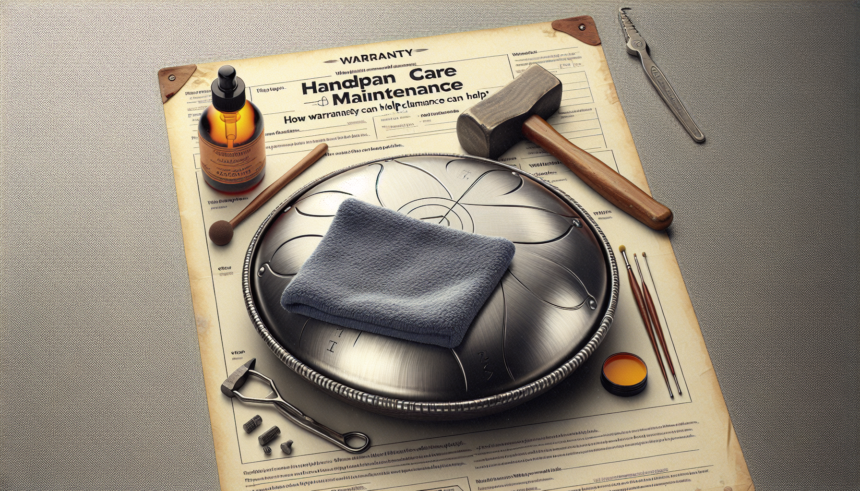The handpan is a unique and captivating musical instrument that requires proper care and maintenance to ensure its longevity and optimal sound quality. Whether you are a seasoned musician or a beginner, understanding how to take care of your handpan can greatly enhance your playing experience. This article will provide you with essential tips for handpan care and maintenance, as well as explain how warranties can help protect your investment.
Understanding Your Handpan
Before diving into maintenance tips, it’s important to have a basic understanding of what a handpan is. A handpan, also known as a hang drum or pantam, is a percussion instrument made from steel. It consists of two convex steel hemispheres glued together at the rim, with a central note or ‘ding’ and several other notes arranged in a circle around it. The handpan is played using the hands and fingers, producing a unique and ethereal sound.
General Handpan Care Tips
- Handle with Clean Hands: Always play your handpan with clean, dry hands. Sweat, oils, and dirt can tarnish the surface and affect the sound quality.
- Storage: Store your handpan in a padded case to protect it from dust, moisture, and physical damage. Keep it in a cool, dry place, away from direct sunlight and extreme temperatures.
- Avoid Impact: The handpan is a delicate instrument. Handle it gently and avoid dropping or hitting it on hard surfaces. Any impact can cause dents and affect tuning.
- Regular Cleaning: Clean your handpan regularly with a soft, dry cloth. For stubborn stains or rust, use a light oil such as coconut or mineral oil. Apply a small amount of oil to the cloth and gently rub the affected area.
- Use Protective Pads: If you’re playing on a rough surface, use a protective pad or cloth underneath your handpan to prevent scratches and dents.
Dealing with Rust
One of the main concerns with handpans is rust. Since handpans are made of steel, they are susceptible to rust, especially if exposed to moisture. Here are ways to prevent and deal with rust:
- Oiling: Regularly oiling your handpan can create a protective barrier against moisture. Use a cloth lightly soaked in oil and gently rub it over the surface. Ensure you remove any excess oil.
- Silica Gel Packs: Place silica gel packs in your handpan’s case or storage area to absorb moisture. This is particularly helpful in humid climates.
- Rust Removal: If you notice rust spots, gently rub them with a fine-grain sandpaper or steel wool. Apply oil afterward to protect the exposed metal.
Maintaining Sound Quality
Maintaining sound quality is crucial for the handpan’s performance. Here are some tips to ensure your handpan stays in tune and sounds its best:
- Regular Playing: Play your handpan regularly to keep it in good playing condition. Regular vibrations help maintain the stability of the notes.
- Avoid Overplaying: Playing your handpan too hard or too often can stress the material and affect its tuning. Balance your playing intensity and duration.
- Tuning: If your handpan sounds off, it might need retuning. It’s recommended to have it tuned by a professional tuner who understands the nuances of handpan acoustics.
How Warranties Can Help
Many reputable handpan makers offer warranties for their instruments. A warranty can provide peace of mind and financial protection in case of certain damages or defects. Here’s how warranties can benefit you:
- Coverage of Defects: A warranty often covers defects in materials or craftsmanship for a specified period. If your handpan has a defect, the warranty may cover repair or replacement costs.
- Protection Against Damage: Some warranties include protections against accidental damage. This can be particularly valuable if you accidentally drop or knock your handpan.
- Support and Service: Warranties often come with customer support and service options, providing guidance on maintenance and care. They might also offer repairs and retuning services.
- Resale Value: A transferable warranty can increase the resale value of your handpan. Potential buyers will be reassured by the protection offered by the warranty.
What to Look for in a Warranty
Not all warranties are created equal. Here are some factors to consider when evaluating a handpan warranty:
- Duration: Look for a warranty with a reasonable duration. Common warranty periods range from one to five years.
- Covered Issues: Understand what is covered by the warranty. Does it cover only defects, or does it include accidental damage and tuning issues?
- Exclusions: Be aware of any exclusions. Some warranties exclude damage due to negligence, misuse, or unauthorized modifications.
- Customer Service: Evaluate the quality of customer service provided by the manufacturer. Responsive and supportive service can make a significant difference in your experience.
Conclusion
Caring for your handpan involves regular maintenance, proper storage, and careful handling. By following the tips outlined in this article, you can ensure your handpan remains in excellent condition and produces beautiful music for years to come. Additionally, investing in a good warranty can provide added protection and peace of mind, allowing you to focus on enjoying your musical journey without worrying about potential damages or defects.
FAQs
1. How often should I clean my handpan?
It’s a good practice to wipe down your handpan with a soft, dry cloth after every playing session. For deeper cleaning, you can use a light oil every few months or as needed, depending on your environment and playing frequency.
2. Can I use any type of oil for my handpan?
No, it’s best to use oils recommended by your handpan manufacturer. Commonly used oils include coconut oil, mineral oil, and specific handpan oils. Avoid using cooking oils or any oil not specifically recommended, as they may cause damage.
3. What should I do if my handpan gets dented?
If your handpan gets dented, it’s important to not try to fix it yourself. Contact a professional handpan tuner or the manufacturer for repair options, as improper handling can further damage the instrument and affect its sound quality.
4. How can I prevent my handpan from rusting?
To prevent rust, ensure your handpan is kept dry and stored in a cool, dry place. Using silica gel packs in your storage case can help absorb moisture. Additionally, regular oiling creates a protective barrier on the surface.
5. Is it necessary to have my handpan professionally tuned?
Yes, if your handpan goes out of tune, it is recommended to have it professionally tuned. Handpan tuning is a delicate process that requires specialized knowledge and tools to ensure the instrument maintains its unique sound quality.





